by Aurola Győrfy // Feb. 29, 2024
The group exhibition ‘this is perfect, perfect, perfect’ at Kunstraum Kreuzberg Bethanien, on view as part of this year’s transmediale, reflects on the indelible presence of online narratives and the non-stop content that gets consumed, while also consuming us. The mechanisms of virtual simulacra have rewritten, restructured and disoriented our realities, leading to the mass fragmentation of attention, and a sense of being stuck in capitalist cycles of two-dimensional opinion-forming, which radically simplify complex socio-cultural and political issues in the name of a “hot take.”
The exhibition’s title refers to the viral TikTok video ‘this is perfect, perfect, perfect,’ exploring how the relentless pursuit of digital attention and monetization of content has transformed the ways in which we perceive and engage with information. The blurred boundaries between online and offline spaces, and the bizarre symbiosis of real and fake content, unravels us, evaporating our need for a coherent worldview, as it no longer seems to be an option. The highlighted works all attempt to engage this distracted and disembodied consumer, who is lost in the pseudo-environment of virtual spaces and can only be re-localized through transgressive, materialistic visuality. These tendencies of new sensuality are present in the installed works in a diverse way, sometimes as fetishized female-presenting bodies promoting digital militarism, sometimes as Dionysian rats celebrating queer nightlife, or fictional A.I. gurus kicking us out of the exhibition space if we are too extraordinary. As visitors to the exhibition, we can feel the dehumanizing sensations of crippling technophobia and anxiety caused by sociological and political power shifts. All of this, we discover, can only be escaped through empathizing with the gaze of a cyborg, and taking in what cyberspace looks like up close.
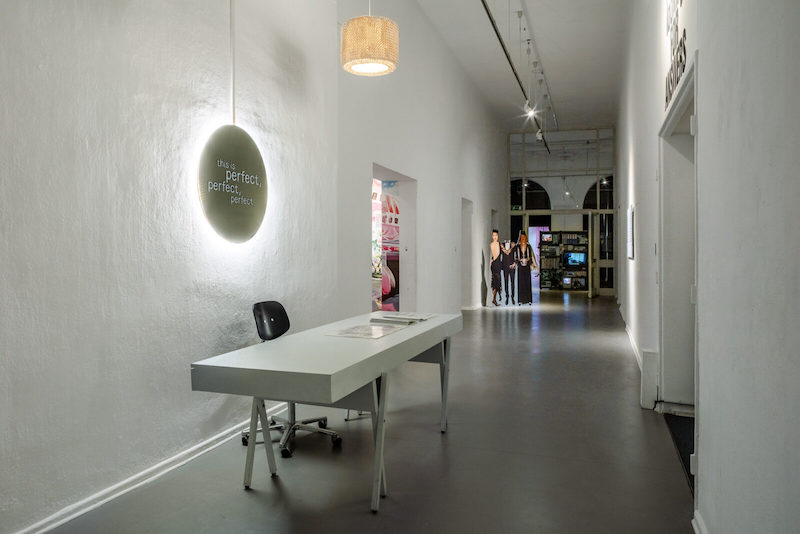
‘this is perfect, perfect, perfect,’ exhibition entrance, transmediale 2024, Kunstraum Kreuzberg/Bethanien// Photo by Luca Girardini
The work ‘Annihilation Core, Inherited Lore’ by Noura Tafeche is a decorated, pink, full-room installation that showcases how social media platforms are sugar coating the violence of militarism and aestheticizing war through the visual codes of kawaii, false female empowerment and the ethos of otaku gamer-girls. Using a soft, pink mouse, we can click through a collection of propaganda memes about the Ukrainian war, female celebrity soldiers from the Israeli Defense Forces promoting violence, or hypersexualized female-presenting bodies with innocent facial expressions holding guns. Otaku is a Japanese expression that refers to individuals who have an intense obsession with the culture and the visual aesthetics of manga and anime—the term originally means “your home” in Japanese and is used to describe those who are deeply involved in a subculture, spending most of their time in alienation, living for their obsession. The two-sided escapism presented in the work not only reflects how we dissolve into simulated realities but also explores the traumatising tendencies of online content, which often goes unnoticed and unprocessed. It will likely be another 20-30 years before we are able to assess the long-term psychological effects of exposure to violent online content, but we can already observe a growing desensitization to more aggressive visual representations in cinema and visual culture.
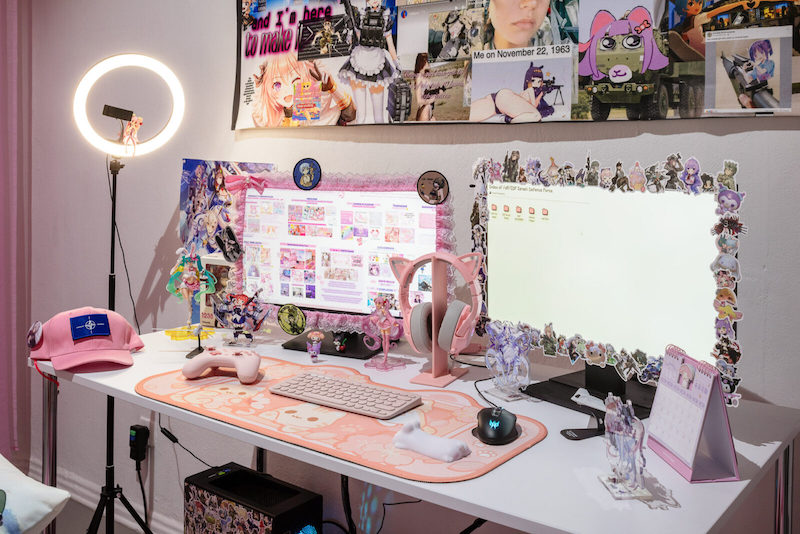
Noura Tafeche: ‘Annihilation Core, Inherited Lore ٩(͡๏̯͡๏)۶,’ 2024, installation view in ‘this is perfect, perfect, perfect,’ transmediale 2024, Kunstraum Kreuzberg/Bethanien // Photo by Luca Girardini
“If you were looking for a direction this is definitely not the place” the monumental video installation ‘The Guru’ (2023) by Ndayé Kouagou tells us. The Paris-based French performer, videographer and writer researches topics of power, vulnerability and queer identity in his artistic practice. The narrator of this video, presented in a separate screening room in the exhibition, is a gender-fluid character who mimics the language and the behavior patterns of modern-day gurus and influencers, but instead of sharing self-help tips or solutions to our problems, we receive a monologue of affirmations about being average. The guru’s words cannot be incorporated into the complex web of our materialistic problems, insecurities and character-shaping challenges since they don’t give us a structure or steps to follow. Just like overly banalized daily horoscope readings, parodying online monologues from social media, the video reflects on the language and shallowness of influencer culture and self-help books. During the monologue, the narrator often stops in the corners of the installation space, the symbolic meaning of corners as a place of punishment here becomes a shelter for those who don’t want to be seen, who are choosing escapism, who are melting into content instead of taking actions. After the 15-minute-long video, we don’t get closer to an answer, and we feel betrayed that we couldn’t get a quick fix about our lives. The image vanishes, and the guru’s silhouette disappears, leaving behind more questions: “Do we expect less or more? Are we trying to give or take? Is this about you or us?”
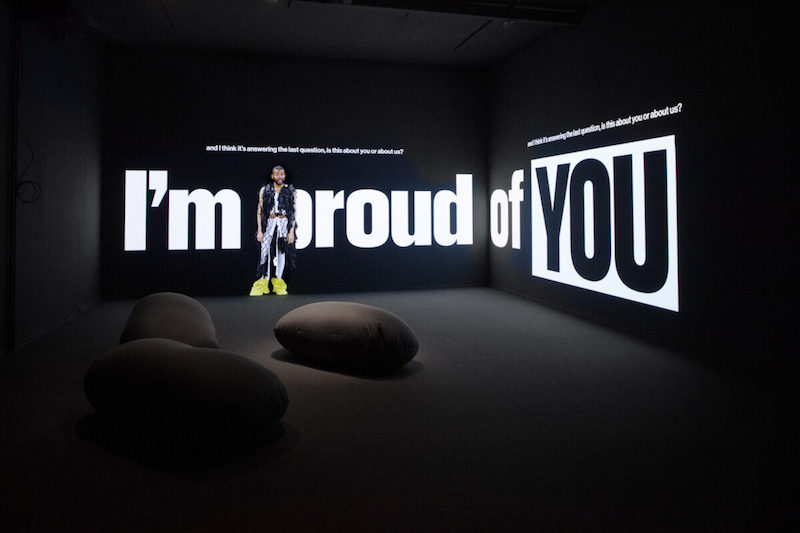
Ndayé Kouagou: ‘The Guru,’ 2024, installation view in ‘this is perfect, perfect, perfect,’ transmediale 2024, Kunstraum Kreuzberg/Bethanien // Photo by Luca Girardini
In another part of the exhibition, Jenkin van Zyl’s video installation ‘Surrender’ follows the story of a visitor, Grace, in the P.E.E.P. (Paradise Engineering Endurance Partnership) Japanese love hotel, where the rat-human hybrid participants aimed at achieving a reunification into a singular entity through bizarre competitions free of conventional binaries and physical limitations. Entering through a colossal, silver rat sculpture serving as the portal into the hotel’s realm, visitors are invited into one of the hotel rooms, where we can comfortably lay down on a bed. Finding an intersection between the euphoric scene of queer nightlife and the atmosphere of 20th-century dance marathons, van Zyl constructs a hallucinatory milieu where the entangled contestants (fuelled by “Limitless Growth” energy drinks) are encouraged to probe their suppressed needs for collective unity and communal resistance. ‘Surrender’ highlights the cracks in the deep structure of capitalist individualism, foregrounding the strategy of surrender as a means of avoiding the ultimate collapse under the burden of radicalized self-representation.
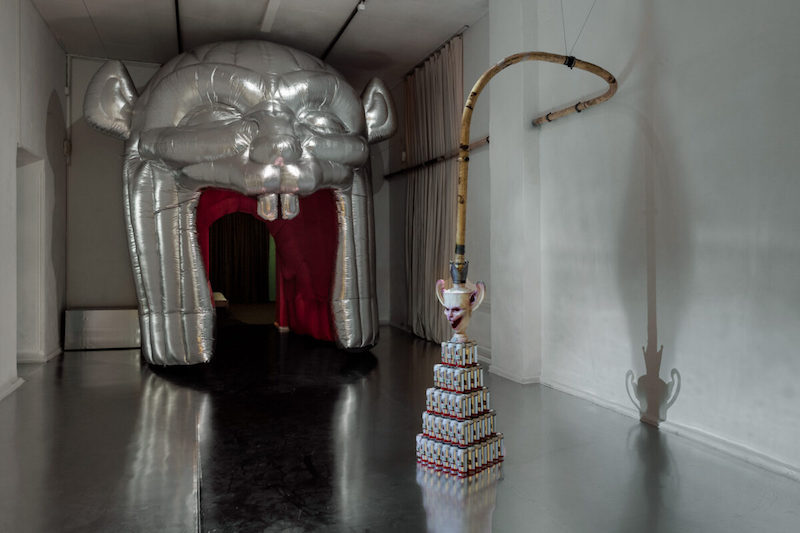
Jenkyn van Zyl: ‘Surrender,’ 2023, installation view in ‘this is perfect, perfect, perfect,’ transmediale 2024, Kunstraum Kreuzberg/Bethanien// Photo by Luca Girardini
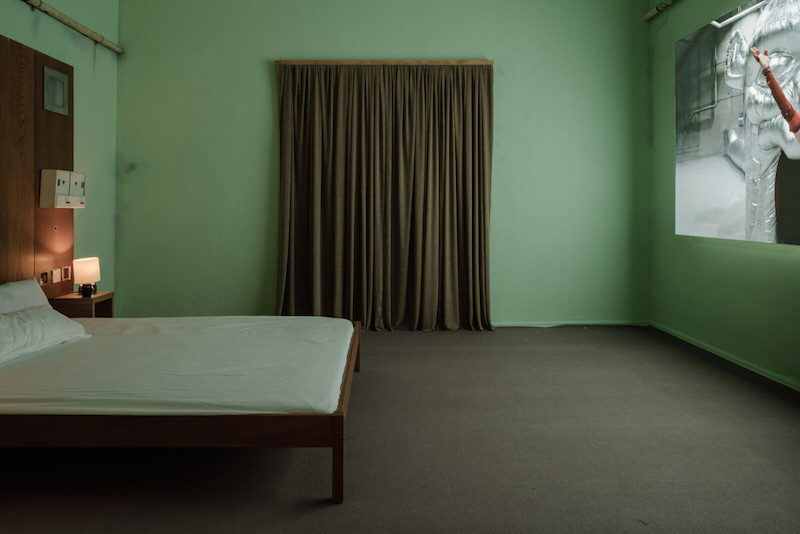
Jenkyn van Zyl: ‘Surrender,’ 2023, installation view in ‘this is perfect, perfect, perfect,’ transmediale 2024, Kunstraum Kreuzberg/Bethanien// Photo by Luca Girardini
The promise of de-hierarchised content consumption in the public virtual space points to our addictions to generalized entertainment that divides our attention in a schizoid manner. We can’t blame the content for our repressed and unnoticed dissatisfaction with ourselves and with capitalism. The exhibition reflects how we haven’t quite dealt with the uncanny side of individualization, and shows just how much we are craving for relatable experiences and a sense of community, even if it’s being generated through algorithms. In the end, it’s our algorithm—it knows us, it knows our favorite topics and always makes us smile, releasing dopamine—even if it’s just for three seconds.
Exhibition Info
Kunstraum Kreuzberg/Bethanien
Group Show: ‘this is perfect, perfect, perfect’
Exhibition: Jan. 31–Apr. 14, 2024
transmediale.de
Mariannenpl. 2, 10997 Berlin, click here for map





















